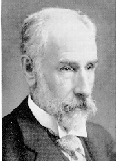

 Francis Edgeworth
Francis Edgeworth
Francis Ysidro Edgeworth was an economists' economist: almost the whole of his literary output was
addressed to his fellow economists, taking the form of elegant technical essays on taxation, monopoly and
duopoly pricing, the pure theory of international trade and the theory of index numbers. He did venture
one larger-scale work, Mathematical Psychics (1881), a quantitative application of utilitarian ethics to
economic life, and its flowery and slightly old-fashioned prose, full of Greek quotations and passing
allusions to classical literature, suggests a wider audience. In fact, however, it was a deep and elusive
work, which even went over the heads of many of his colleagues. Its use of indifference curves caught on
only slowly and that of the 'core' of an exchange economy has only recently attracted attention as a
result of developments in games theory. His exposition was terse and obscure at the best of times and his
personality was retiring, with the result that most of his ideas were and still are continually being
rediscovered by those who arrive at them in their own way.
....
© Mark Blaug, Great Economists Before Keynes: An Introduction
to the Lives and Works of One Hundread Great Economists of the Past
, Brighton: Wheatsheaf, 1986. In Stauffer Library: HB76 .B62
1986t
 Francis Edgeworth
Francis Edgeworth

 Francis Edgeworth
Francis Edgeworth